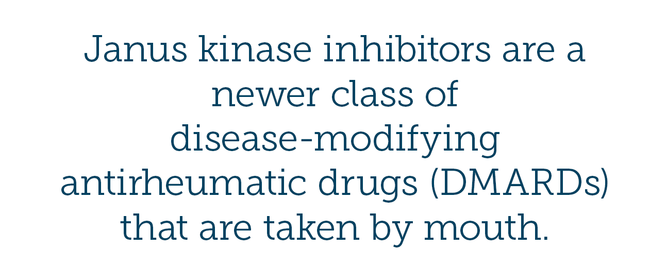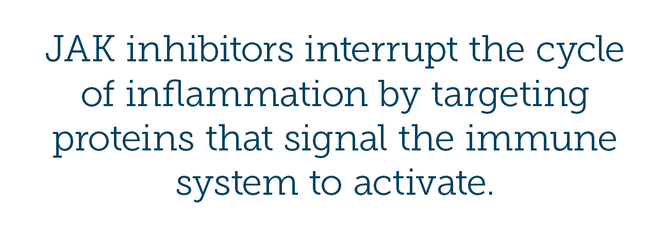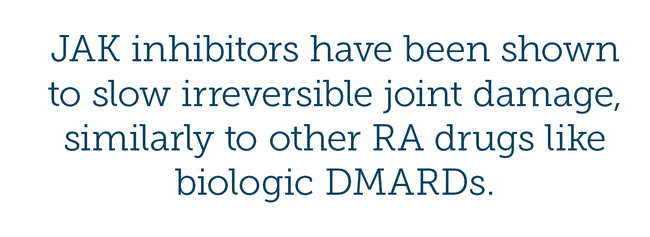
Powered By





 Continue with Facebook
Sign up with your email
Continue with Facebook
Sign up with your email
Rheumatoid arthritis (RA) is an autoimmune disease caused by an overactive immune system that attacks the lining of the joints. Janus kinase (JAK) inhibitors are one class of drugs used in the treatment of RA. These drugs work by inhibiting overactive JAK proteins in cells that cause inflammation. JAK inhibitors can help slow the disease progression and irreversible joint damage often seen in RA.
Janus kinase inhibitors are a newer class of disease-modifying antirheumatic drugs (DMARDs) used to treat inflammatory diseases like RA. These small-molecule drugs are available as pills or tablets that are taken by mouth. JAK inhibitors can be used alone or in combination with other DMARDs (such as methotrexate) to help control RA.

To understand how JAK inhibitors work, it’s important to learn a little about JAK proteins, the immune system, and inflammation.
The Janus family of kinases (JAK) consists of three main proteins: JAK1, JAK2, and JAK3. Kinases are responsible for relaying signals from cells to other proteins in what is known as a signaling pathway. When these proteins become overactive and signal too much, it can lead to imbalance.
JAK proteins are responsible for mediating inflammation in the body. Cytokines are messengers of inflammation which attach to their receptor on the outside of cells. When cytokines attach, JAK proteins are turned on and tell cells to make more cytokines. This creates a loop that promotes inflammation, which can be important in fighting infections.
However, this loop can be damaging in rheumatic diseases. In the case of RA, JAK signaling continues to occur and is not shut off naturally by the cells. This leads to too much inflammation and overactivation of the immune system, causing it to attack healthy tissues in the body. The joint lining, known as the synovium, is the tissue targeted in RA.
JAK inhibitors interrupt the cycle of inflammation by targeting proteins that signal the immune system to activate. JAK inhibitors bind directly to the JAK proteins inside cells. When the drug is bound to JAK, it disrupts the signal to other proteins in the cell. This stops the loop of inflammation, and prevents the immune system from being activated further.

The U.S. Food and Drug Administration (FDA) has approved three JAK inhibitors for the treatment of RA. These include first- and second-generation drugs that have been developed to target JAK protein signaling in cells. One benefit of these drugs is that they specifically inhibit only JAK proteins, rather than the entire immune system, which helps reduce side effects and toxicity.
Xeljanz (tofacitinib) is an oral tablet used in adults to treat RA, in addition to other autoimmune diseases. It works by inhibiting JAK1, JAK2, and JAK3 signaling proteins. The tablet is taken two times a day with or without food. There is also an extended-release tablet that can be taken once daily with or without food. Xeljanz is given to people who did not respond well to — or are allergic to — methotrexate. It was approved by the FDA to treat RA in November 2012.
Olumiant (baricitinib) is a once-daily pill used to treat moderate to severe RA in adults. It works by inhibiting JAK1 and JAK2 signaling proteins. Olumiant is given to people who had an inadequate response to biologic medications that inhibit tumor necrosis factor (TNF), such as Humira (adalimumab) and Enbrel (etanercept). Olumiant was approved by the FDA to treat RA in May 2018.
Read more about how TNF inhibitors and other classes of biologics treat RA.
Rinvoq (upadacitinib) is a once-daily, extended-release tablet used to treat RA in adults. It works by inhibiting the JAK1 signaling protein. Rinvoq is given to people who do not tolerate or respond well to methotrexate. Rinvoq may be given on its own or in combination with methotrexate. Rinvoq was approved by the FDA to treat RA in August 2019.
Filgotinib was previously tested in clinical trials as a JAK1 inhibitor for the treatment of RA. However, the FDA rejected the drug’s approval request due to concerns about toxicity and its safety profile. Clinical trials are currently underway for other second-generation JAK inhibitors used to treat RA, including Peficitinib (ASP015K) and Itacitinib.
JAK inhibitors have been shown to slow irreversible joint damage, similarly to other RA drugs like biologic DMARDs. In clinical trials and studies, Xeljanz and Olumiant were shown to slow the progression of structural joint damage by reducing inflammation in the lining of the joints. This effect was seen using a method known as radiographic progression. JAK inhibitors have been shown to slow the damage caused to the cartilage and bone surrounding the synovium on joints.

Rinvoq, Xeljanz, and Olumiant also met the American College of Rheumatology’s criteria for improvement in symptoms using the ACR20, ACR50, ACR70 scoring system. Participants saw either 20 percent, 50 percent, or 70 percent improvement in their RA symptoms.
Unfortunately, there is currently no cure available for RA. Therefore, the overall goal of treatment is to stop inflammation or reduce it to the lowest levels possible in order to relieve symptoms and slow further joint damage. If RA continues to progress, it can lead to permanent joint damage and disability. DMARDs such as JAK inhibitors can control active rheumatoid arthritis and reduce inflammation, helping you lead a healthier life.
Read more about how DMARDs can slow the progression of joint damage.
You are not alone in living with RA. When you join myRAteam, you gain a community of more than 137,000 others who know what it’s like to live with a rheumatic disease.
Have you taken JAK inhibitors for your RA? What was your experience? Share your experiences below in a comment or in a post on myRAteam.
Get updates directly to your inbox.



 Continue with Facebook
Sign up with your email
Continue with Facebook
Sign up with your email
Become a member to get even more




A myRAteam Member
I used Rinvoc earlier this year for 4 months. I was told it wasn’t working because I have severe rheumatoid arthritis. It did I believe cause mouth sores. But it was just a pill that seemed at… read more
We'd love to hear from you! Please share your name and email to post and read comments.
You'll also get the latest articles directly to your inbox.